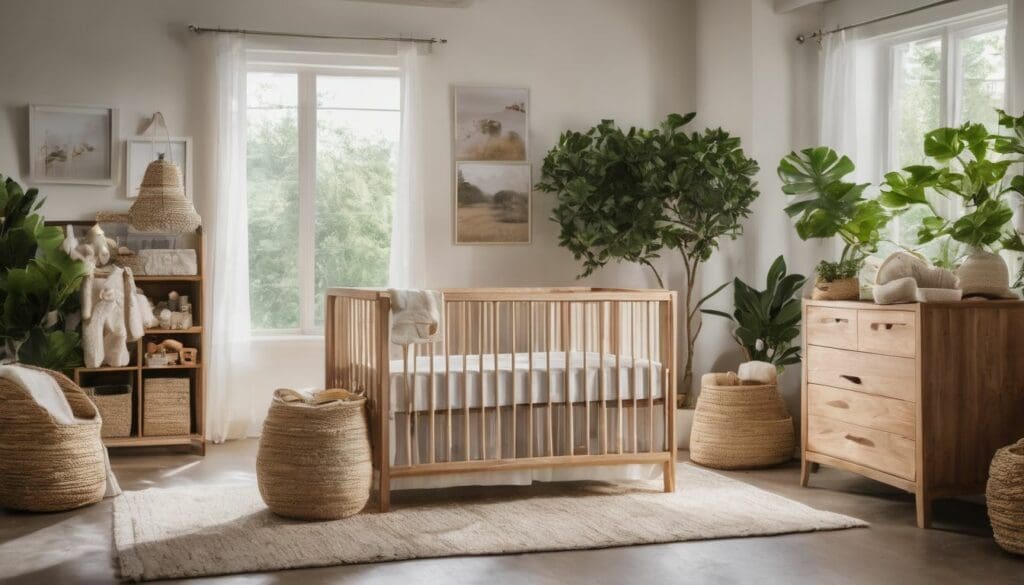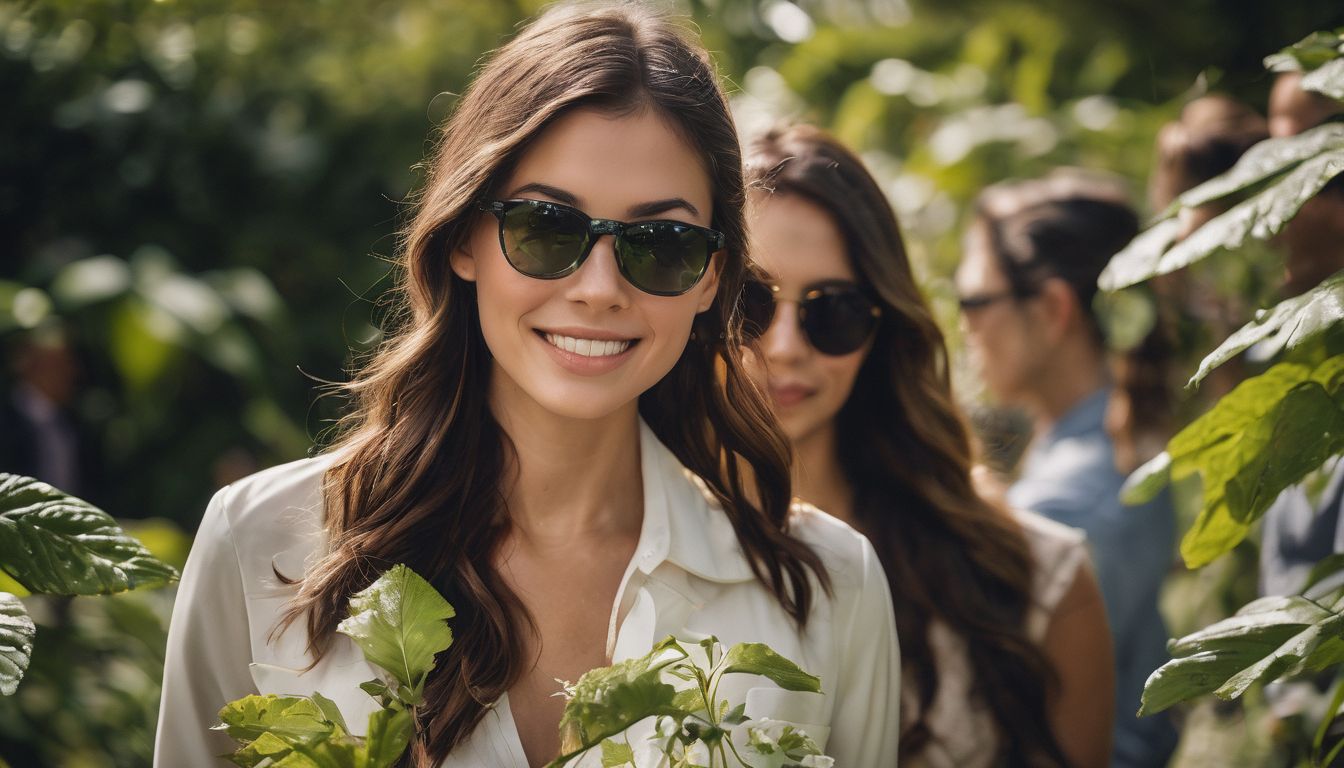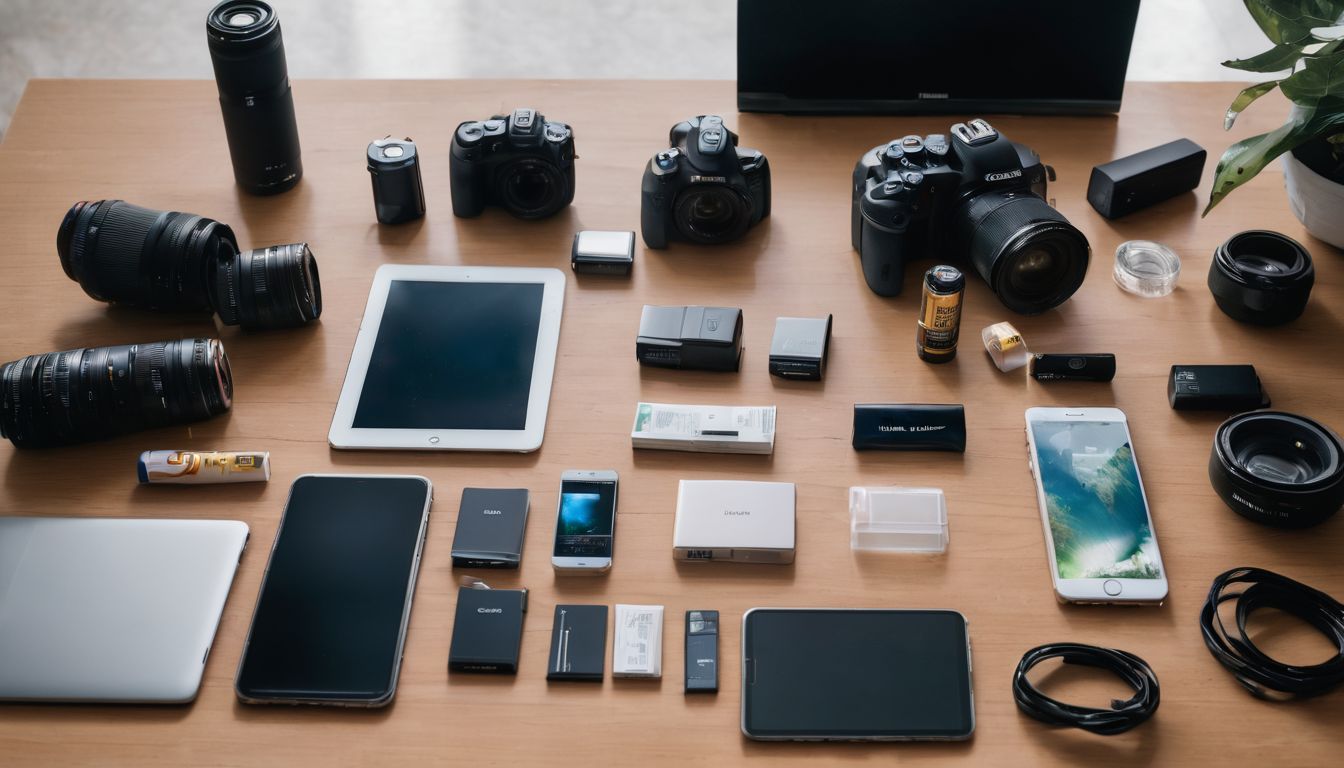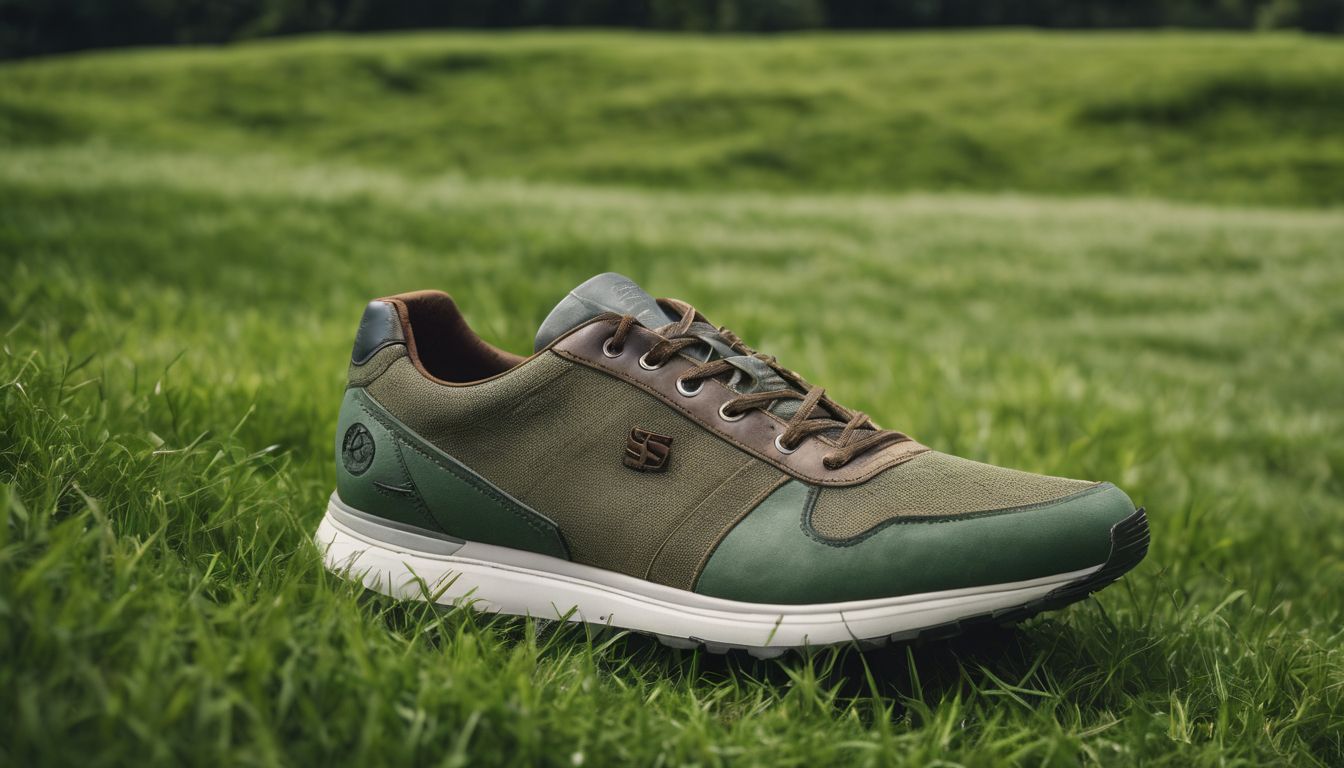As parents, it’s our heart’s desire to do the very best for our little ones, yet we often find ourselves at a crossroads when trying to align their needs with our responsibility towards Mother Earth.
Like many of you, we’ve grappled with this dilemma and have meticulously scoured resources to uncover eco-friendly options that don’t compromise on your wee one’s comfort or your convenience as a parent.
Our carefully curated guide navigates you through sustainable baby products designed to make sure your child’s ecological footprint is as dainty as their actual footprints—all while ensuring practicality remains hand in hand with peace of mind for mums and dads.
Join us as we embark on an odyssey into a more verdant approach to those non-negotiable parenting essentials!
Key Takeaways
- Choosing sustainable baby items like cloth diapers and organic cotton clothing reduces waste and exposure to harmful chemicals, benefitting both the environment and your child’s health.
- Eco – friendly baby products come in many forms, including reusable wipes, nursing pads, food containers, snack bags and swim diapers that save money over time while decreasing environmental impact.
- Look for certifications such as Global Organic Textile Standard (GOTS) or OEKO – TEX when selecting products to ensure they meet high environmental standards.
- Reading reviews from other eco – conscious parents helps identify the best quality and most reliable sustainable baby products on the market.
- By considering the longevity and versatility of baby items, you can make responsible choices that are not only better for the planet but also grow with your child.
Why Choose Sustainable Baby Products?
Sustainable baby products are designed with the health of both babies and the environment in mind. Choosing eco-friendly options helps reduce waste, exposure to harmful chemicals, and supports ethical practices in production.
Definition of sustainable baby products
Sustainable baby products are items designed to have minimal impact on our Earth. They’re crafted from materials that are organic, biodegradable, or recyclable and are often produced with ethical labour practices.
We choose fabrics free of harsh chemicals, ensuring they’re safe for your little one’s delicate skin and better for the planet too.
Our favourite sustainable items include reusable nappies and eco-friendly baby clothing, made to last and reduce waste. These green solutions align with natural parenting philosophies by promoting a healthier environment for our children’s future.
Let’s embrace products like zero-waste baby essentials and earth-friendly infant gear that reflect our commitment to conservation and environmental well-being.
Benefits for both baby and the environment
Choosing sustainable baby products has numerous benefits for both the little one and the environment. By opting for eco-friendly options such as biodegradable nappies, organic clothing, and reusable baby essentials, we reduce exposure to harmful chemicals for our babies while also minimising our carbon footprint.
Organic baby products are gentle on delicate skin, reducing the risk of irritation and allergic reactions. Additionally, embracing reusable items like cloth nappies and wipes not only saves money in the long run but also significantly reduces landfill waste, contributing to a healthier planet for future generations.
Embracing sustainable baby products is not just about benefiting our little ones; it’s also an impactful way to contribute to environmental conservation efforts. By supporting zero-waste initiatives through using ecofriendly baby wipes and biodegradable nappies, we actively reduce plastic pollution from traditional single-use items.
With each purchase of nontoxic and natural baby care products or ethically sourced clothing, we promote ethical supply chains that advocate fair wages and safe working conditions for workers in developing countries.
Eco-Friendly Diapering
When it comes to eco-friendly diapering, there are choices to be made between cloth and disposable diapers. We will also give you tips on promoting equitable access and reducing the environmental impact of diapering.
Cloth vs. disposable diapers
As we delve into eco-friendly baby care, the debate between cloth and disposable nappies is crucial to consider for the health of our environment and our little ones.
| Cloth Nappies | Disposable Nappies |
|---|---|
| Reusable and can be used for multiple children. | Single-use and contribute to landfill waste. |
| Require water and energy for washing. | Convenient but produce chemical and plastic waste. |
| Greater initial investment but cost-effective over time. | Constant repurchasing necessary, more expensive in the long run. |
| Made from natural materials, less risk of nappy rash. | Often contain fragrances and gels that can irritate sensitive skin. |
| Significantly reduce carbon footprint with proper care. | Account for huge amounts of non-biodegradable waste. |
| Diverse styles and materials available, promoting comfort. | Standard sizes and materials, with less personalisation. |
Tips for eco-friendly diapering
When choosing sustainable baby products, consider using cloth nappies as an eco-friendly alternative to disposable ones. Cloth nappies are reusable, reducing waste and environmental impact. Use biodegradable and chemical-free nappy creams to minimise harm to the environment and your baby’s delicate skin. Opt for cloth wipes rather than disposable ones to reduce waste and save money in the long run. Consider investing in a nappy service that cleans and reuses cloth nappies.
Diaper tax and promoting equitable access
When considering eco-friendly diapering, it’s essential to address the issue of diaper tax and promoting equitable access. Governments should consider lowering or eliminating taxes on eco-conscious diapers to make them more affordable for all families.
This can help promote equitable access to sustainable diapering options and encourage more people to choose environmentally friendly products. By reducing financial barriers, governments can support efforts towards a greener future and ensure that all families have equal access to sustainable baby products.
Moreover, advocating for policies that provide subsidies or incentives for eco-friendly diapers can further promote their use among environmentally conscious parents. These initiatives can contribute to reducing the environmental impact of traditional disposable diapers while making sustainable options accessible to a wider population.
Essential Reusable Baby Products
When it comes to sustainability, reusable baby products are a game changer. From cloth diapers and wipes to nursing pads and snack bags, these essentials not only reduce waste but also save you money in the long run.
Cloth diapers
When considering eco-friendly alternatives for diapering, cloth diapers are a sustainable choice that can significantly reduce waste. Unlike disposable diapers that end up in landfills and take hundreds of years to decompose, cloth diapers can be reused multiple times before needing to be replaced.
They come in different styles such as prefolds, flats, fitted, and all-in-one options, catering to various preferences and lifestyles. With the advancements in fabric technology, modern cloth diapers offer excellent absorbency and leak protection without chemicals or additives.
By choosing cloth diapers, you can contribute to minimising environmental impact while providing a comfortable and breathable option for your baby.
Using cloth wipes alongside cloth diapers is another environmentally friendly choice. Reusable wipes made from soft fabrics like cotton or bamboo are gentle on the baby’s skin and eliminate the need for disposable wipes that end up adding to landfill waste.
Cloth wipes
Cloth wipes offer a sustainable alternative to disposable baby wipes. They can be washed and reused, reducing waste and environmental impact. Using cloth wipes also eliminates the exposure of your baby’s delicate skin to harsh chemicals often found in disposable wipes, promoting a healthier and more natural approach to skincare.
Opting for cloth wipes aligns with our commitment to ecoconscious and nontoxic baby products that support conservation efforts. By making small changes like using cloth wipes, we contribute to a greener future for our little ones.
Next, let’s delve into the essential reusable nursing pads as part of sustainable baby products.
Reusable nursing pads
When choosing sustainable baby products, reusable nursing pads are an essential eco-friendly alternative to disposable counterparts. These pads are made from soft, natural materials such as bamboo or organic cotton, offering comfort while being gentle on the skin and the environment.
They are washable and can be reused multiple times, reducing waste from single-use disposable options. Additionally, using reusable nursing pads is a cost-effective choice for environmentally conscious parents, as they eliminate the need for continuously purchasing disposable alternatives.
Moving forward in our guide to eco-friendly baby products, let’s explore sustainable options for baby food containers and snack bags.
Reusable baby food containers and snack bags
When considering eco-friendly baby products, it’s essential to focus on reusable items like baby food containers and snack bags. Opting for these sustainable alternatives not only reduces single-use plastics but also minimises waste, contributing to a healthier environment for our little ones.
These durable containers and bags are perfect for storing homemade baby food and snacks on the go, offering practicality without compromising sustainability. By making the switch to reusable baby food storage solutions, we can actively participate in reducing plastic pollution while providing safe and convenient options for our children.
Reusable swim diapers
When considering eco-friendly baby products, reusable swim nappies are a practical choice for environmentally conscious parents. Made from sustainable materials, these reusable swim nappies contribute to reducing waste and minimising the environmental impact compared to disposable options.
With adjustable sizing and durable fabrics, they offer long-term value and versatility for growing babies, making them a sustainable and cost-effective choice.
Furthermore, reusable swim nappies provide a comfortable fit while also preventing leaks in the pool or at the beach. The use of these ecoconscious baby products aligns with promoting conservation and reducing unnecessary waste.
Sustainable Baby Products for Different Categories
When it comes to sustainable baby products, there are plenty of options available in different categories such as clothing, nursery items, playtime toys, feeding essentials and bathing products.
Each category offers eco-friendly alternatives that are safer for your baby and better for the environment.
Clothing
When considering eco-friendly baby clothing, look for items made from organic cotton, bamboo, or hemp. These materials are sustainable and often produced without harmful pesticides and chemicals.
Opting for second-hand clothing is also an eco-conscious choice, reducing the demand for new production and extending the lifecycle of garments. Additionally, choosing timeless styles and gender-neutral pieces can allow clothes to be passed down to siblings or other families.
Ensuring that your baby’s wardrobe consists of natural fabrics like cotton will contribute to minimising their exposure to potentially harmful synthetic materials. When washing baby clothes, consider using a mild detergent with biodegradable ingredients to minimise environmental impact.
Nursery items
When designing an eco-friendly nursery, consider sustainable options for furniture, bedding, and decor. Opt for organic cotton or bamboo bedding to provide a natural and chemical-free environment for your baby.
Choose non-toxic paint and finishes on furniture to minimise indoor air pollution. Incorporate energy-efficient lighting and use low VOC (volatile organic compound) paints to reduce environmental impact.
Consider second-hand or upcycled furniture as an environmentally friendly option that also reduces waste.
Invest in durable nursery items that can be repurposed as your child grows, such as convertible cots or multi-functional storage solutions. Look for items made from recycled materials and produced through sustainable practices when decorating the nursery.
By choosing eco-friendly nursery items, you can create a safe and healthy space for your baby while minimising your environmental footprint.
Playtime toys
Moving on from nursery items, playtime toys are another area where we can make eco-friendly choices for our little ones. When selecting sustainable playtime toys, opt for items made from natural and biodegradable materials such as wood, organic cotton, or bamboo.
These materials not only reduce environmental impact but also provide a safer option for your baby to explore and play with. Look out for eco-friendly certifications and labels to ensure that the toys meet high standards of sustainability.
Additionally, consider choosing versatile toys that can grow with your child and have minimal packaging to reduce waste.
Feeding essentials
When sourcing eco-friendly feeding essentials for your baby, consider opting for products made from sustainable materials like bamboo or organic cotton. Look for BPA-free, phthalate-free, and lead-free options to ensure the safety of your little one.
Choosing reusable feeding supplies such as silicone bibs, stainless steel cutlery, and glass baby bottles can significantly reduce waste and promote a greener lifestyle.
Seek out ethically produced items that minimise environmental impact throughout their lifecycle while also being functional and durable enough to withstand daily use. Make informed choices by considering the ecological footprint of the packaging and transportation involved in getting these essentials to you.
Bathing products
When selecting bathing products for your baby, opt for eco-friendly options that are gentle on your little one’s skin and the environment. Look for organic or natural baby washes and shampoos that are free from harsh chemicals, fragrances, and dyes.
Consider bamboo washcloths or soft organic cotton towels instead of synthetic materials to reduce microfibre pollution.
Additionally, choose sustainable baby bath toys made from non-toxic materials like natural rubber or wood. These choices not only benefit your child but also contribute to a healthier planet by minimising plastic waste in our oceans and landfills.
By being mindful of the bathing products you select, you can support conservation efforts while providing the best care for your precious bundle of joy.
How to Choose the Best Sustainable Baby Products
When choosing sustainable baby products, it’s important to consider the materials used, look for certifications and labels, read reviews from other eco-conscious parents, and consider the longevity and versatility of the product.
Making informed choices can help you find high-quality items that are better for your baby and the environment.
Consider the materials used
When choosing sustainable baby products, consider the materials used in their production. Look for items made from organic cotton, bamboo, hemp, or recycled materials as they are eco-friendly and gentle on your baby’s skin.
Avoid products containing synthetic chemicals, dyes, and fragrances to minimise environmental impact and reduce the risk of allergic reactions. Opting for natural fibres also ensures that fewer harmful substances are released into the environment during manufacturing and disposal.
Selecting items with biodegradable or compostable materials helps reduce waste in landfills and supports a circular economy. By prioritising renewable resources such as wood, silicone, glass, stainless steel, and BPA-free plastics for baby essentials like toys and feeding utensils you can make a significant difference in reducing your carbon footprint while providing safe alternatives for your little one.
Look for certifications and labels
When choosing sustainable baby products, look for certifications and labels that indicate a product’s environmental friendliness. Seek out trusted eco-friendly certifications such as Global Organic Textile Standard (GOTS), OEKO-TEX Standard 100, or Forest Stewardship Council (FSC) for wood-based products.
These labels ensure that the materials used are safe for your little one and have been sourced responsibly. Moreover, look for biodegradable or compostable labels on packaging to ensure minimal environmental impact when disposing of the product.
By prioritising certified eco-friendly options, you can make informed choices that benefit both your baby and the environment.
Be discerning when selecting sustainable baby products by seeking out reputable eco-conscious logos like “Rainforest Alliance Certified” or “Fair Trade Certified.” These certifications demonstrate a commitment to ethical sourcing practices and fair treatment of workers involved in the production process.
Read reviews from other eco-conscious parents
When considering sustainable baby products, it can be incredibly helpful to read reviews from other eco-conscious parents. Their experiences with different brands and products can provide valuable insights into the quality, durability, and overall environmental impact of various baby items.
By learning from their experiences, you can make informed decisions about which eco-friendly baby products are best suited for your little one while also supporting environmentally responsible companies.
Reading reviews from like-minded parents can also help you discover new or lesser-known brands that align with your values and meet high ethical and sustainability standards. Additionally, these reviews may highlight any potential issues or challenges that could arise when using certain sustainable baby products, giving you a more comprehensive understanding of what to expect before making a purchase.
Consider the longevity and versatility of the product
When choosing sustainable baby products, it’s vital to consider the longevity and versatility of each item. Opt for well-made items that can grow with your baby or serve multiple purposes, such as adjustable cloth diapers that fit from infancy to toddlerhood or a convertible high chair that transforms into a regular chair.
This approach not only reduces waste but also saves money in the long run, making it a win-win for both your family and the environment.
Ensuring the longevity and versatility of eco-friendly baby products is key to minimising environmental impact while maximising their utility throughout your child’s early years. By selecting adaptable and durable items, you are making a conscious choice towards sustainability without compromising on functionality or quality.
Conclusion
In summary, choosing eco-friendly baby products is a positive step towards creating a sustainable future for our children. We can make a difference by opting for reusable and biodegradable items.
Together, let’s embrace ethical and green choices in every aspect of caring for our little ones. Join the movement towards eco-conscious parenting and foster a healthier planet for generations to come.
FAQs
1. What are eco-friendly baby products?
Eco-friendly baby products include sustainable baby items like biodegradable nappies, natural baby clothing, and zero-waste gear that minimise environmental impact.
2. Why should I choose eco-conscious baby gear?
Choosing eco-conscious baby gear helps reduce waste and supports ethical manufacturing practices while keeping your little one safe from harsh chemicals.
3. Can I find green baby products that are stylish and functional?
Yes! There’s a wide range of green baby products available that don’t sacrifice style for sustainability; you can find everything from earth-friendly infant clothing to practical accessories.
4. Are all natural baby items more expensive than regular ones?
Not necessarily – while some natural or organic items may cost a bit more, there are many affordable options for parents looking to switch to eco-friendly essentials without breaking the bank.





